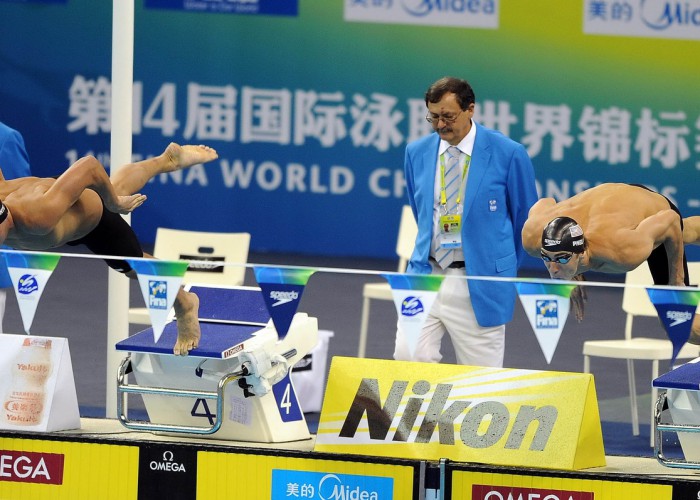Do You Remember Ryan Lochte-Michael Phelps 200 IM Battle Royale From 2011 Worlds?
Each week until the start of the swimming competition at the world championships, Swimming World will look back at a previous performance at the world championships that still carries significance.
Coverage of the World Championships is sponsored by Wylas Timing
By Jeff Commings, Swimming World Senior Writer
Michael Phelps and Ryan Lochte have raced many times against each other in their 11-year rivalry, but very few races have been as electrifying as the 200 individual medley final at the 2011 world championships.
Going into the race, Lochte had the upper hand, having beaten Phelps in the 200 freestyle earlier in the meet. Plus, he was the current world record holder, having stolen it from Phelps at the 2009 world championships. The two didn’t have many events in common, and the 200 IM was their first major head-to-head matchup, at the 2004 Olympic Trials, and it has grown since then. No other men’s event features just two names in the top 10 performances of all time, and no one else has owned the world record since 2003.
When the two lined up for the 200 IM final in 2011 in Shanghai, everyone knew the race for gold would only involve Phelps and Lochte. No one thought much about the possibility of a world record, though. This was the first long course world championships since FINA banned the polyurethane full-body suits that reshaped the sport and created world records that many thought would take nearly a decade to break. A few short course world records had been set at the 2010 short course world championships, but the long course records were deemed much more difficult. Lochte had chased his 1:54.10 200 IM world record at the 2010 Pan Pacific championships, but fell off the pace in the freestyle leg. In Shanghai, the main goal was the race, not the time. But after the race, it was the time that had people talking more than the outcome.
The race started out as expected. Phelps, who was still the reigning butterfly king, led after that stroke by a scant six hundredths of a second over Lochte. Showing he was intent on exhausting Phelps before the halfway point, Lochte blasted through the backstroke leg to get an arm’s length lead. But Phelps rallied in the final 10 meters of backstroke to cut the margin down to 19 hundredths of a second.

Breaststroke could be viewed as the weaker of the four strokes for Phelps and Lochte, so neither was going to gain much of an advantage on that stroke. As he did in the backstroke, Lochte was extremely aggressive through 35 meters of breaststroke, opening up a half-body lead. But another surge by Phelps in the final three strokes got him back in the race. Turning into the freestyle leg, it was just 19 hundredths of a second between Lochte and Phelps as the two kicked furiously underwater before emerging for the freestyle leg.
Lochte had the better underwater dolphin kicking, regaining that half-body length lead with 25 meters to go. As mentioned before, Lochte beat Phelps in the 200 free, but Phelps outsplit Lochte by .29 in the final 50 of the 200 free. If Phelps could replicate that, the 200 IM gold medal was going to be decided by hundredths.
As if he crossed some magical barrier, Phelps began accelerating exactly halfway through the freestyle leg and began chipping away at Lochte’s lead. With Lochte breathing toward Phelps, he knew the race was going to be close. Lochte didn’t take a breath for the final 10 meters, while Phelps kept taking in the much-needed oxygen with five meters to go. The final three strokes looked like synchronized swimming between the pair, and we can be very thankful to live in an age of electronic timing. The finish was too close to call for the human eye.
Instantly, the placings and the time went on the board. Lochte beat Phelps by 16 hundredths of a second, and the crowd cheered. Perhaps the cheers were not to celebrate Lochte claiming the victory, but for the world record time of 1:54.00 that blew away all expectations. Phelps nearly got under Lochte’s old record with a 1:54.16.
A techsuit world record had been broken! And it only took 18 months to do it. Incidentally, Lochte was slower than world record pace through the first three strokes, but to outsplit himself in the final 50 meters when the techsuits were helping the most says a lot about not just the race but Lochte’s fortitude.
“All I can say is summed up in one word: Jeah! That’s really all,” Lochte said after the world record. “I knew it was going to be a battle between Michael and I, but I got the better end this time. Anytime you break a world record you have to be excited. I trained hard and it paid off.”
Phelps, who notoriously said he hates to lose, had this to say about getting the silver medal:
“I felt good, but I thought I was a little long at the finish and that cost me the race,” Phelps said. “I’m a little disappointed, but at the same time it is faster than I went in 2008 at the Olympics, so that’s a good thing. [Tonight] frustrated me more than anything, because I thought I was going to get that one. But, it is what it is.”
200 IM final, 2011 world championships
Only Phelps has been able to get close to that time since 2011. He won the 2012 Olympic Trials 200 IM with a 1:54.84, then won his third-straight 200 IM Olympic title with a 1:54.27. Lochte dipped under 1:55 in 2013, defending his world championship title with a 1:54.98, but the time is essentially light years behind his world record.
Though Phelps will not be at this year’s world championships, the competition in the 200 IM will be just as intense as it was in 2011. Lochte will likely go up against the Japanese duo of Kosuke Hagino and Daiya Seto, while Brazil’s Thiago Pereira and Lochte’s American teammate Conor Dwyer could be in the mix as well.
Previous world championship retrospectives:
Le Jingyi and the Chinese women at the 1994 world championships








Yes. Even I know him at special Olympics Seminole County.
I do that one at special Olympic.
It’s impossible to forget!